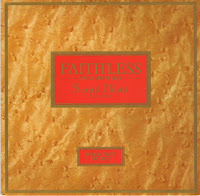"Words like "righteous, testify and faith" do not a soul record make but this is studded with more soul than 78% of the trans-Atlantic garbage on offer this week."
— Martin Fry
It didn't occur to me the first time 'round but it is shocking just how piss poor the bulk of the singles on offer this fortnight are. This outstanding Single of the Fortnight aside, there's aren't many winners present. And don't go away assuming that some of them are brilliant records that the public ignorantly passed on; the bulk of this sorry bunch is dreary faux-soul or tired post-punk. It's almost as if not everyone was meant to create sturdy pop.
Two that succeeded in doing so were ABC's Martin Fry and Scritti Politti's Green Gartside. As I already mentioned the last time "Faithless" came up, the two had their similarities in coming out of punk before eventually evolving into purveyors of slick eighties' sophisti-pop. It's a transition that isn't easily squared unless the petty critic takes the simplistic path of charging that they both "sold out".
If you happened to caught an early Scritti Politti gig in Camden or heard one of their D.I.Y. efforts like "Skank Bloc Bologna" on John Peel's Radio 1 show, then went several years without encountering them before coming across mid-eighties' hits like "Wood Beez" or "The Word Girl" then it be understandable to conclude that they had indeed "sold out". If, however, you'd been paying close attention to their progress then there's no excuse. Those scratchy indie records had always been leaden with literary and political references but it took longer for the music to catch up. The excellent compilation Early displays a gradual shift from skeletal post-punk towards the soul music that Green had grown up on.
The other thing is that the minimalism was still present even as the presentation and sound had shifted. Like "The "Sweetest Girl"" before it, "Faithless" is soulful and lush but so too is it as bare as anything he released half-a-decade earlier. The Blue Nile's Paul Buchanan would express surprise that the D.I.Y. punk ethos hadn't been identified in his group's work since chords were kept to a minimum, their playing was deceptively simplistic and they had little beyond a Linn drum machine in terms of backing. On "Faithless" there is a little more going on than on, say, "Tinseltown in the Rain" but when a vocodor and a trio of backing vocalists in place of a gospel choir are what you're relying upon for backing then
Moving away from post-punk but not quite ready to embrace pop the way they would on 1985's Cupid & Psyche '85, this period of Scritti Politti's erratic lifespan has been somewhat forgotten. Their smattering of hits was still a ways off and Green would eventually return to the guitars following several largely successful experiments with hip hop which concluded at the end of the nineties. What is one to do, then, with a part of the group that few identify with?
Album Songs to Remember (as well as its companion singles "The "Sweetest Girl"", "Faithless" and the double A-side "Asylums in Jerusalem"/"Jacques Derrida" which were all decked out in gorgeous sleeves making them all look like luxury goods purchased Hong Kong airport's duty free lounge) deserves much better. Rather than being too much of a compromise between what came before and what was to come, it is the most fully realised account of Green's immense musical talents. His deconstructionist pop peaked during this time, with future attempts being much more loving and heartfelt and not in the spirit of his literary interests.
To the extent that Scritti Politti did sell out, the best they were capable of was a Top 20 album and three singles which all stalled outside the Fun 40 — hardly a case of Green selling his soul for pop stardom. More to the point, his creativity wasn't dulled in pursuit of the mainstream; it is only in a
~~~~~
Also Reviewed This Fortnight
Shakin' Stevens: "Shirley"
With such a pitiful pile of singles to deal with, is it any wonder Fry overdoes the praise a little for the latest from Shakin' Stevens? Shakey "sounds like he enjoys making records and that sets him apart from 95% of the other acts on display today". Too right but does his obvious enjoyment translate into a top record? It's good fun like many of his nibs' big hits but there's not a whole lot to it. Clocking in at just over two minutes, it nevertheless feels a bit too long. That said, he hammers the point home much more annoyingly on




.jpg)






